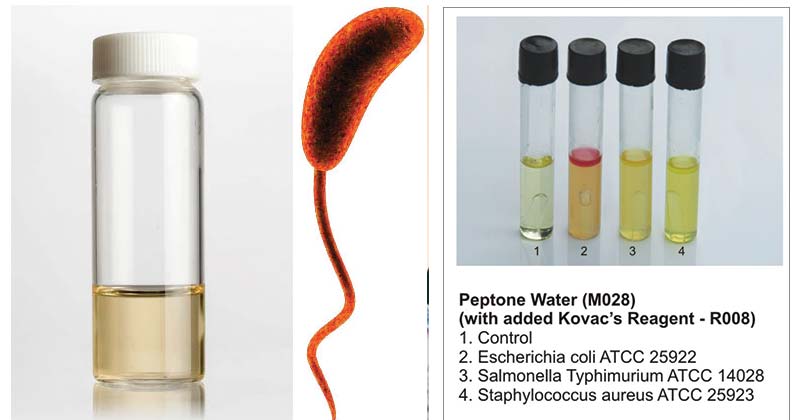Peptone Water is formulated as per Shread, Donovan, and Lee. It is a broth medium used for the growth of the organism and a base for determining carbohydrate fermentation patterns of non-fastidious organisms. In addition, it is also used for the detection of indole production by the organism.

Interesting Science Videos
Composition of Peptone Water
| Ingredients | Gms / L |
| Peptone | 10.0 |
| Sodium chloride | 5.0 |
Final pH (at 25°C) 7.2±0.2
Principle of Peptone Water
The two basic components of peptone water are peptone and sodium chloride. Peptone provides nitrogenous and carbonaceous compounds, long-chain amino acids, vitamins provide essential nutrients. Sodium chloride provides the necessary electrolyte and maintains the osmotic balance of the medium.
It is particularly suitable as a substrate in the study of indole production. Peptone used in Peptone Water is rich in tryptophan content that aid in the detection of the indole using either Kovacs or Ehlrich reagent. Peptone Water is also utilized as a base for carbohydrate fermentation studies with the addition of sugar and indicators such as bromocresol purple, phenol red, or bromothymol blue. It is recommended for studying the ability of an organism to ferment a specific carbohydrate which aid in the differentiation of genera and species. The acidity formed during fermentation can be detected by the addition of a phenol red indicator, which shows a color change of the medium from red to yellow under acidic conditions. In order to detect gas production if produced by the organism, the Durhams tube is inserted into the medium.
Preparation of Peptone Water
- Suspend 15.0 grams in 1000 ml distilled water.
- Mix thoroughly and distribute into the final containers.
- Sterilize by autoclaving at 15 lbs pressure (121°C) for 15 minutes.
Result on Peptone Water
A positive result (inoculated medium): Growth, turbidity seen
A negative result (uninoculated medium): No growth
Uses of Peptone Water
- Peptone Water is used as a growth medium and as a base for carbohydrate fermentation media.
- It is a broth medium used for the detection of indole.
- It is minimal growth medium which is used for determining carbohydrate fermentation patterns of non-fastidious organisms.
- It is useful as a diluent or for making suspensions of non-fastidious microorganisms for microbial enumeration procedures.
- Peptone Water with pH adjusted to 8.4 (alkaline condition) is suitable for the cultivation and enrichment of Vibrio species.
Limitations
- It is recommended that biochemical, immunological, molecular, or mass spectrometry testing be performed on colonies from pure culture for complete identification.
- The medium is not well suited for the growth or maintenance of fastidious microorganisms due to its low nutrient content.
- Due to nutritional variations, some strains may show poor growth.
- Some sugar solutions may affect the pH of the Peptone Water, hence checking must be done.
- Sub-cultures may be necessary to ensure the purity of the inoculant. Mixed or contaminated cultures will give false reactions.
References
- Himedia
- Thermo Fisher Scientific
- Hardy Diagnostics
- Neogen
